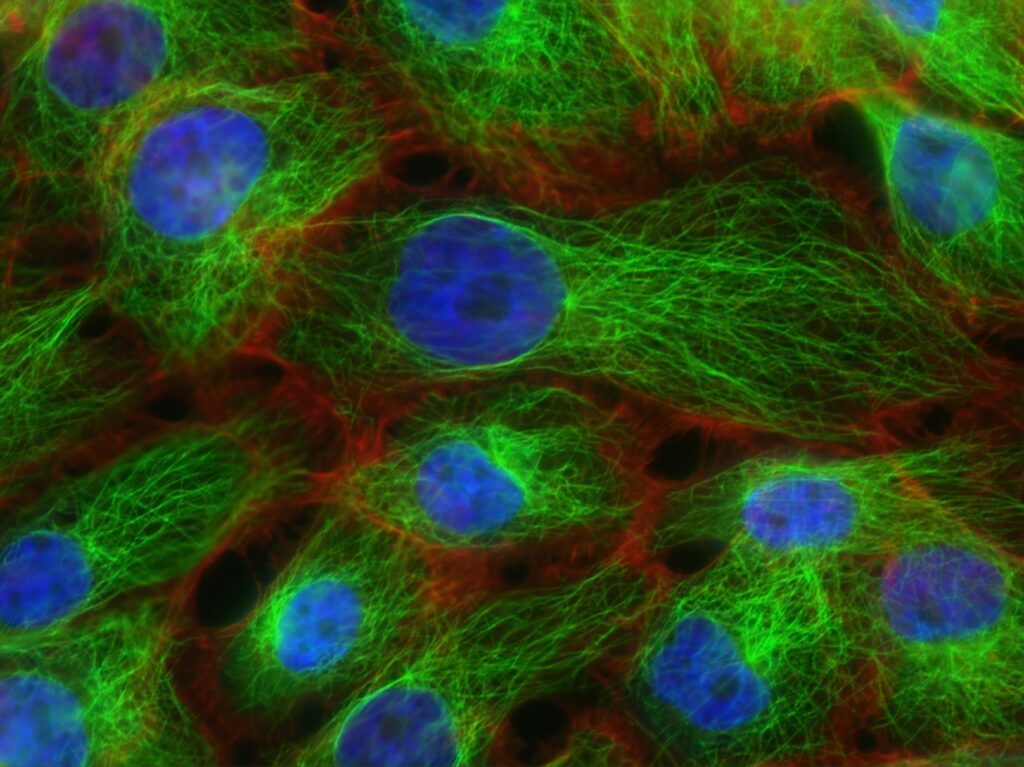Breast Cancer Awareness Month, Part 2: What to Know About Metastatic Breast Cancer

Washington State Department of Health
In 2009, House and Senate resolutions unanimously established October 13 as a day to recognize and bring awareness to metastatic breast cancer.
Even though a single day is not enough, it does mark a starting point for year-round awareness of MBC and why it’s important to understand this type of cancer.
On this day, buildings worldwide will light up in pink, teal, and green to support awareness of metastatic breast cancer, also called stage IV breast cancer.
This year in Washington, the Seagen Headquarters (Bothell) and the Columbia Center (Seattle) will shine in these colors. Here is a list of other participating landmarks across the United States.
How metastatic breast cancer develops
When cancer cells break away from a tumor, they can travel to other parts of the body. MBC happens when cancer that began in the breast spreads (metastasizes) to other parts of the body, such as nearby lymph nodes, bones, liver, and lungs. It is also different than other stages of breast cancer, as it means you will likely have breast cancer for the rest of your life.
MBC can affect anyone, regardless of age or gender. This includes:
- People with breast cancer who got treatment.
- People who never received treatment.
- People with aggressive breast cancer types, such as triple-negative breast cancer.
Treatment options for metastatic breast cancer
MBC is serious. This advanced stage of breast cancer can’t be cured and is more challenging to treat. However, treatments do exist. These lifelong treatments often focus on keeping the cancer under control and maintaining your quality of life. More people are now living longer with MBC as medical researchers find new ways to treat the disease.
Although MBC is cancer that has spread to another part of the body, it’s still breast cancer and treated as breast cancer. For example, breast cancer that has spread to the bones is still breast cancer, not bone cancer.
For people with MBC, systemic drug therapies are the main treatments. These may include:
- Hormone therapy
- Chemotherapy (chemo)
- Targeted drugs
- Immunotherapy
- Some combination of the above
Treatment choices are guided by the cancer type, location, and the extent of cancer spread in the body, previous treatments, and other factors.
Can you prevent MBC?
Unfortunately, there is no way to completely prevent MBC. But there are a few ways to lower your risk and find it early. These include:
- Following your treatment plan: If you have received treatment for breast cancer, the most important way to avoid developing metastatic breast cancer is to continue with the treatment plan recommended by your care team.
- Staying physically active: Regular physical activity helps lower your risk for commonly occurring cancers.
- Moderating alcohol consumption: The less alcohol you drink, the lower your risk for some types of cancer.
- Staying on schedule with screening mammograms as your doctor directs.
Learn more ways of reducing your breast cancer risk.
(Centers for Disease Control)
Early detection through mammograms
Early detection of MBC through regular breast cancer check-ups is crucial. Although early detection doesn’t cure cancer or prevent it from coming back in the future as metastatic disease, it can play an important part in treatment. Regular mammograms after a breast cancer diagnosis may help find MBC early.
Most major health insurance plans cover mammograms for free. If you or a loved one has limited or no insurance coverage and a lower income, you can contact the Breast, Cervical and Colon Health Program at the Washington State Department of Health for free screenings. Call 1–888–438–2247 to find out if you qualify.
Schedule your free or low-cost mammogram and encourage others to do the same on October 21, National Mammography Day. Here are a few resources to help you find free or low-cost mammograms in Washington.
- Breast, Cervical and Colon Health Program
- Breast Index — Inland Imaging (Spokane area)
- Breast, Cervical, & Colon Health | Yakima County, WA
- Breast cancer screening | SCCA|Fred Hutchinson Cancer Center (seattlecca.org)
- Mammograms in Washington | Kaiser Permanente
- Mammography Guidelines | Confluence Health
- Swedish Mobile Mammography Program | Swedish Medical Center Seattle and Issaquah
Ways to raise awareness and resources
You can use your vehicle license plate to support loved ones with MBC, encourage others to get screened, or start a conversation about breast cancer.
Breast cancer awareness plates display the iconic pink ribbon and carry the message “Early detection saves lives.” You can get these plates at the Department of Licensing, and part of the fees will support free breast cancer screening services in Washington state.
Resources for people living with MBC and ways to support them:
- Metastatic Breast Cancer Network (mbcn.org)
- Metastatic breast cancer | Living Beyond Breast Cancer (lbbc.org)
- Living with Metastatic Cancer Support Group (Cancer Lifeline)
- MBC Organizations and Resources | Young Adults Facing Breast Cancer Together | Young Survival Coalitions
- Tools and resources for caregivers (Susan G. Komen)
- Improving Quality of Life: Using Palliative Care for MBC Patients (Susan G. Komen®)
- Support — METAvivor Breast Cancer Research and Support (METAvivor)
- Breast Cancer — Metastatic: Palliative and Supportive Care (Cancer.Net)
Sign up and get notified when we post new articles to our blog!
Follow us on Facebook, Twitter(X), Instagram, and LinkedIn.
Visit our website for more from the Washington State Department of Health.


